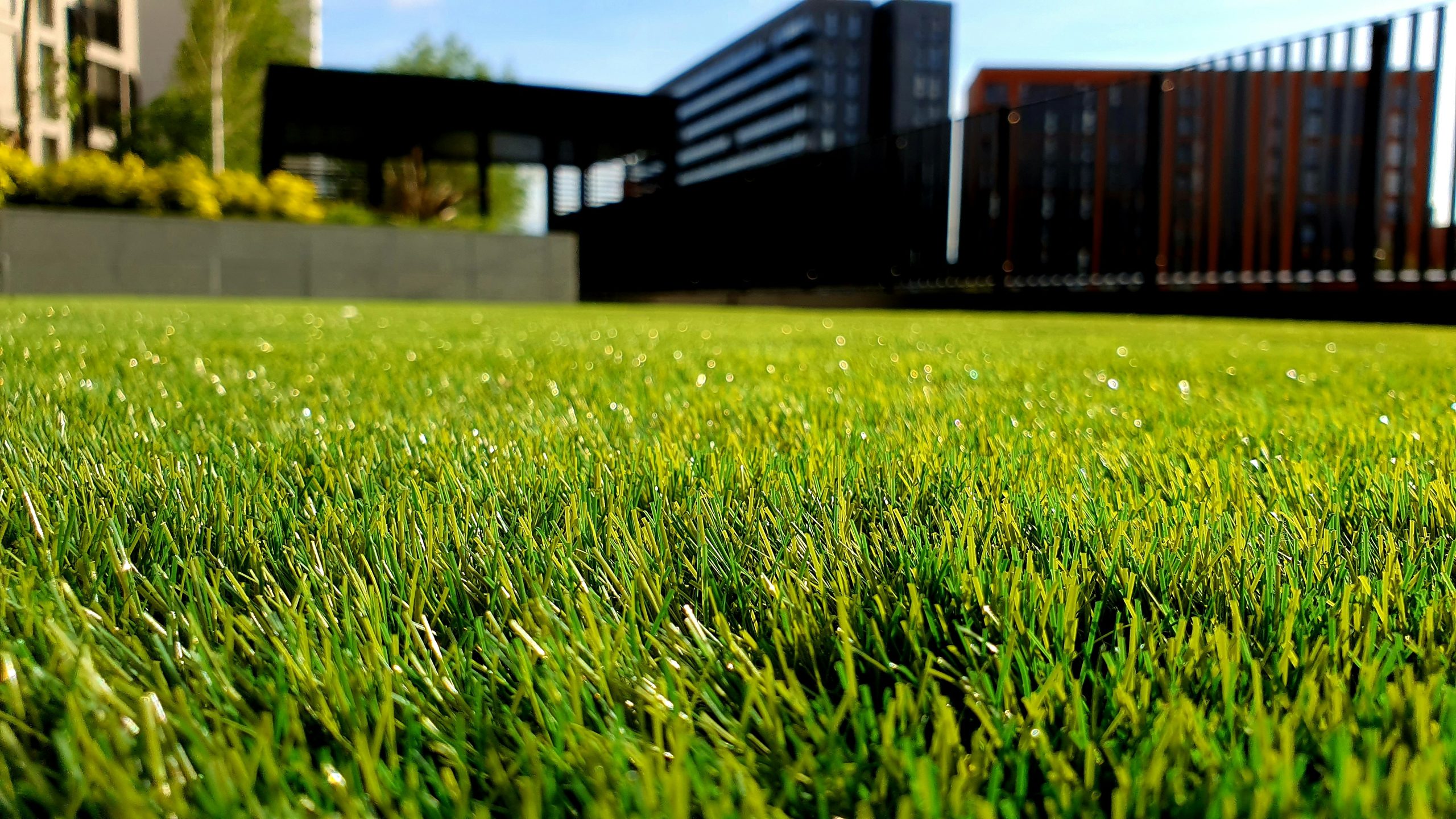Have you thought about the impact of your beautiful lawn on the earth? Eco-friendly lawn care offers a way to help our planet and community. By taking care of your lawn naturally, you help the soil, water, and air.
Many typical lawn care methods aren’t good for the environment. They use too much water and fertilizer. U.S. homes use more water for their lawns than farms use for major crops. So, using sustainable landscaping is vital. Practices like mulching, overseeding, and reducing chemicals make your lawn great and eco-friendly.
Key Takeaways
- Eco-friendly lawn care promotes healthier soil and cleaner air.
- Minimizing water use and chemical reliance is crucial for sustainability.
- Mulching and green tools are great alternatives to excessive fertilization.
- Understanding your lawn’s water usage can inspire more responsible irrigation practices.
- Adopting eco-conscious yard maintenance contributes to global environmental efforts.
Understanding Eco-Friendly Lawn Care
Eco-friendly lawn care helps your yard grow without harming the Earth. It focuses on natural ways to keep your lawn healthy. This includes using organic products and methods that are easy on the planet.
Definition of Eco-Friendly Lawn Care
Eco-friendly lawn care is about growing a yard that’s good for everyone. It means using natural ways to keep the grass green and reduce the need for harmful chemicals. This includes using organic products, watering wisely, and avoiding practices that hurt nature.
Importance of Sustainable Practices
Sustainable lawn care is key for a healthy yard and planet. It helps save water and keeps the air clean. By not using too many chemicals, you protect the planet. This makes the soil better and helps plants and animals live well.
Using natural methods means you use less water and help important bugs. These bugs help plants grow and clean up the Earth. So, taking care of the lawn the right way benefits us all.
Eco-Friendly Mowing Practices
Choosing to mow the eco-friendly way is important for a chemical-free lawn. It’s also key for a landscape that doesn’t harm the planet. By picking the right tools and methods, you’ll keep your lawn green and healthy. And you’ll be good to the earth too. Let’s dive into what you need to know for green lawn care.
Choosing the Right Mower
When looking at mowers, consider manual or electric ones. They’re much better for the environment than the usual gas mowers. Manual mowers work well for small spaces. They get you moving and cut down emissions. If you have a bigger lawn, think about an electric mower. It’s quieter and uses less power. Look for models from Greenworks or Sun Joe for great eco-friendly choices.
Proper Mowing Techniques
How you mow matters a lot for your lawn’s health. It’s best to avoid cutting too much of the grass at once. Follow the “rule of thirds” by not cutting more than one-third of the grass each time. This keeps your lawn healthy and less stressed. Make sure to keep your mower blades sharp. This leads to cleaner cuts and keeps diseases away.
Match your mowing to what your grass needs. For example, letting your grass grow taller helps the roots get stronger. This means less water is needed, and your lawn will be tougher. Stick to these tips and have a great lawn while being kind to the earth.
Natural Lawn Feeding Techniques
Using natural methods to feed your lawn is key for a strong lawn and a healthy planet. Organic fertilizers and making your own compost can make the soil and grass better. This leads to a lush and environmentally friendly lawn.
Benefits of Organic Fertilizers
Organic fertilizers are important for earth-friendly lawn care. They add nutrients slowly, helping the soil and grass without harming the environment. This way, the grass grows well, the soil gets better, and we protect our rivers and ponds from harmful chemicals.
DIY Compost for Lawn Care
Making compost at home saves money and helps the earth. You can use food scraps and yard cuttings to create nutritious compost. This compost makes the soil rich and supports strong, healthy grass. By adding organic matter to the ground, you’re building a natural system that keeps your lawn in good shape for a long time.
Water Conservation Strategies
Water conservation is key for eco-friendly lawn care. Use smart watering methods to help the environment and save on water costs. Strategies like collecting rainwater and planting drought-resistant grass help save water responsibly.
Best Times to Water Your Lawn
Choosing the right time to water your lawn is important. Water in the early morning or late at night when it’s cooler. This approach helps your soil soak up more water, which means you use less overall.
Installing Rain Barrels
Rain barrels help you make the most of rainwater. They collect water from your roof, reducing the need for city water. This way, you can use rainwater for your plants and lawn, which is great for the planet.
Drought-Resistant Grass Varieties
Selecting grass that can handle dry spells is wise for saving water. Certain types need much less water, perfect for areas with little rainfall. Bermuda, Buffalo, and Zoysia grass are great picks. They keep your lawn green and healthy while using less water.
Integrated Pest Management (IPM) in Lawn Care
Integrated Pest Management (IPM) is a top-notch way to keep your lawn lush without harmful chemicals. This method uses several ways to control pests. It aims to know the pests’ life stages and homes to keep them in check the right way.
IPM shines because it helps you have a chemical-free lawn. By blending mechanical, cultural, and biological methods, your lawn becomes a place where pests don’t find much interest. There’s less need for chemicals, meaning the good bugs can thrive, too.
Take mowing and aeration, for example, these simple tasks can keep pests away. Adding their natural enemies is another green and potent method. Integrated Pest Management looks at all angles of lawn care, fitting perfectly with eco-friendly lawn care values. It’s a way to have a greener, safer, and more fun outdoor area for everyone.
Reducing Chemical Use
Changing from pesticides and fungicides makes lawn care better for the environment. By using natural ways and focusing on strong plants, we need less chemicals. This helps good bugs and microorganisms in the soil. It also stops chemicals from getting into our water. Less chemicals in your yard contribute to protecting plant and animal life everywhere.
Natural Alternatives to Pesticides and Fungicides
Finding natural options like neem oil or ladybugs can be good for your lawn. These methods keep away pests but don’t harm the environment. A simple mix of water, soap, and baking soda can also fight fungus.
How Chemical-Free Practices Benefit the Environment
Going chemical-free helps the local area. It keeps soil and water healthy by not using damaging chemicals. This also helps in saving plants and animals. Choosing natural ways supports the planet in big ways.
Promoting Biodiversity in Your Yard
Understanding the importance of biodiversity is key to helping the environment. By making your yard more eco-friendly, you can help local ecosystems. This not only makes your garden look better but also helps our planet.
Planting Native Species
Planting native species is a great way to boost biodiversity. These plants are perfect for your area’s weather and soil, needing less water and care. They also help bees and butterflies by offering food like nectar and pollen.
Choosing native plants helps your garden fit into the local ecosystem. It gives different wildlife food and homes. This means more insects and birds, creating a lively and diverse yard.
Creating Habitats for Wildlife
Adding habitats for wildlife can do a lot for your yard. Things like wildflower meadows, birdhouses, and woodpiles turn your space into a safe area for animals. They provide places for wildlife to live and breed.
Doing yard work the eco-friendly way really helps local biodiversity. Planting native species and setting up spaces for wildlife makes a big difference. Your yard can become a healthier place for many different creatures.
Enhancing Soil Quality
Keeping soil healthy is key for a green, eco-friendly lawn. Test your soil to understand its condition. This insight will help you improve its quality, needing fewer products for growth.
Conducting Soil Tests
Soil tests check nutrients, pH, and what the soil’s made of. They help you plan the best care for your lawn. Testing kits let you know what your soil needs to grow great grass.
Amending Soil with Organic Matter
Adding compost or mulch improves soil health. It makes soil better for roots and helps water drain. Doing this makes your lawn stronger and helps it grow well.
Aeration Strategies
Aerating your lawn breaks up hard soil, letting water and nutrients in. Regular aeration helps air and food get to roots. Use different aeration methods like core or spike to keep your soil and lawn healthy.





